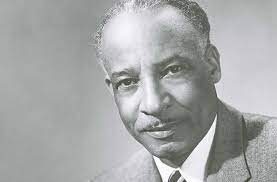by Jarrett Hoffman

•Today: clarinet and strings at the Covenant, Jerusalem Quartet (pictured) at CCMS, and Oberlin Chamber Singers at Fairchild
•Announcement: tickets available for Re:Sound Festival
•Almanac: William Levi Dawson, the “Dean of African American Choral Composers”
HAPPENING TODAY:
At 12 pm, the Church of the Covenant presents a chamber music concert featuring clarinet and strings (clarinetist Dominic Giardino, violinists Guillermo Salas Suárez and Phaik Tzhi Chua, violist Jonathan Goya, and cellist Jane Leggiero). The program is titled “Drama and Delight at the Dawn of Romanticism,” and it includes Bernhard Crusell’s Op. 4 Clarinet Quartet in c and Anton Reicha’s String Quartet in G, Op. 90, No. 2. A freewill offering will be taken up. You can also stream it here.
Strings take center stage at at Disciples Christian Church at 7:30 pm, when the Jerusalem Quartet — violinists Alexander Pavlovksy and Sergei Bresler, violist Ori Kam, and cellist Kyril Zlotnikov — will visit the Cleveland Chamber Music Society, bringing with them Prokofiev’s Quartet No. 2 in F, Shostakovich’s Quartet No. 10 in A-flat, and Bartók’s Quartet No. 6. Brian MacGilvray will give a pre-concert lecture at 6:30. Tickets are available here.
Also at 7:30, at Fairchild Chapel, Ben Johns will lead the Oberlin Chamber Singers in works by Robert Schumann, Gustav Holst, Erika Lloyd, Charles Stanford, Irving Berlin, Ward Swingle, Mozart, and Billy Joel — program details and livestream link here. It’s free.
ANNOUNCEMENTS:
Tickets are now available for the Re:Sound Festival (June 8-11). See details about the lineup and schedule here, and click here if you’d like to help out, whether you’re offering a homestay or just looking to volunteer in general.
TODAY’S ALMANAC:

Dawson’s musical story begins at the Tuskegee Institute (now Tuskegee University). Having run away from home early in his youth, he began studying music there full-time as a pre-college student, participating in the choir, band, and orchestra, and covering his tuition by working as a music librarian and manual laborer.
After going to college in Chicago and serving as trombonist with the Civic Orchestra of Chicago, he began teaching in Kansas City public schools, then returned to Tuskegee for what would become a 25-year tenure on the faculty. During that time, he led the school’s choir, famously developing its reputation to the point that it was invited to perform at the opening of Radio City Music Hall, and to sing for two sitting presidents.
Not just a choral conductor, Dawson is known as the “Dean of African American Choral Composers,” particularly due to his arrangements of and variations on spirituals. Among the most well-known of those works is Ezekiel Saw the Wheel. Listen to a recording by the Tuskegee Institute Choir under Dawson here.
In the instrumental world, his most famous work is the Negro Folk Symphony, which was premiered by Leopold Stokowski and the Philadelphia Orchestra in 1934 at Carnegie Hall. The work received a good deal of positive press before descending, despite the composer’s best efforts, into a long period of obscurity — one that may be finally ending. In 2020, it was recorded by Arthur Fagen and the ORF Vienna Radio Symphony Orchestra. Listen to the second movement, titled “Hope In the Night,” here.
Dawson’s story ends where it began. After passing away in Montgomery, he was buried in the Tuskegee University cemetery.
Other anniversaries on this date include the birth of Italian composer Alessandro Scarlatti (1660), the death of German composer Giacomo Meyerbeer (1864), and the birth of Belgian conductor Philippe Herreweghe (1947).



